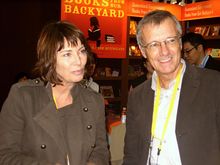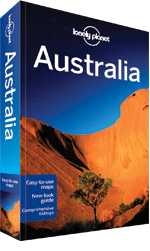| Parent company | Lonely Planet Global, Inc. |
|---|---|
| Founded | 1973 |
| Founders | |
| Country of origin | Australia |
| Headquarters location | Fort Mill, South Carolina, U.S. |
| Distribution |
|
| Key people | Philippe von Borries (President; November 2020 – May 2023) |
| Publication types | Books Mobile apps Video Magazine |
| Nonfiction topics | Travel guides (Worldwide) |
| Owner(s) | Red Ventures |
| No. of employees | 400 staff, 200 authors |
| Official website | lonelyplanet.com |
Lonely Planet is a travel guide book publisher. Founded in Australia in 1973, the company has printed over 150 million books.
History

20th century
Lonely Planet was founded by married couple Maureen and Tony Wheeler. In 1972, they embarked on an overland trip through Europe and Asia to Australia, following the route of the Oxford and Cambridge Far Eastern Expedition.
The company name originates from the misheard "lovely planet" in a song written by Matthew Moore. Lonely Planet's first book, Across Asia on the Cheap, had 94 pages; it was written by the couple in their home. The original 1973 print run consisted of stapled booklets with pale blue cardboard covers.
Wheeler returned to Asia to write Across Asia on the Cheap: A Complete Guide to Making the Overland Trip, published in 1975.
The Lonely Planet guide book series initially expanded to cover other countries in Asia, with the India guide book in 1981, and expanded to rest of the world later on. Geoff Crowther was renowned for frequently inserting his opinions into the text of the guides he wrote. His writing was instrumental to the rise of Lonely Planet. The journalist used the term "Geoffness", in tribute to Crowther, to describe a quality that has been lost in travel guides.
By 1999, Lonely Planet had sold 30 million copies of its travel guides. The company's authors consequently benefited from profit-sharing and expensive events were held at the Melbourne office, at which Lonely Planet authors would arrive in limousines.
21st century

In 2007, the Wheelers and John Singleton sold a 75% stake in the company to BBC Worldwide, worth an estimated £63 million at the time. The company was publishing 500 titles and ventured into television production. BBC Worldwide struggled following the acquisition, registering a £3.2 million loss in the year to the end of March 2009. By the end of March 2010, profits of £1.9 million had been generated, as digital revenues had risen 37% year-on-year over the preceding 12 months, a Lonely Planet magazine had grown and non-print revenues increased from 9% in 2007 to 22%.
Lonely Planet's digital presence included 140 apps and 8.5 million unique users for lonelyplanet.com, which hosted the Thorn Tree travel forum. In 2011, BBC Worldwide acquired the remaining 25% of the company for £42.1 million (A$67.2 million) from the Wheelers.
BBC's sale to NC2

By 2012, BBC wanted to divest itself of the company and in March 2013 confirmed the sale of Lonely Planet to Brad Kelley's NC2 Media for US$77.8 million (£51.5 million), at nearly an £80 million (US$118.89 million) loss.
Red Ventures
In December 2020, NC2 Media sold Lonely Planet to Red Ventures for an undisclosed amount. Lonely Planet offices continue to operate in Dublin, Nashville and New Delhi. Phillippe von Borries, a former co-founder and CEO of Refinery29, was named head of the company.
In 2022, Lonely Planet bought Elsewhere, a website that links travellers directly with experts who assist in designing trips.
In 2024, Lonely Planet announced that it withdrew from the market in China and ceased publishing travel guides in simplified Chinese.
Products
Lonely Planet's online community, the Thorn Tree, was created in 1996. It is named for a Naivasha thorn tree (Acacia xanthophloea) that has been used as a message board for the city of Nairobi, Kenya since 1902. The tree still exists in the Stanley Hotel, Nairobi. In April 2020, the forum was locked and left in read-only mode as part of Lonely Planet temporarily halting business in response to the COVID-19 pandemic. In September 2021, the Thorn Tree was shut down.
In 2009, Lonely Planet began publishing a monthly travel magazine called Lonely Planet Traveller. It is available in digital versions for a number of countries.
Lonely Planet also had its own television production company, which has produced series, such as Globe Trekker, Lonely Planet Six Degrees, and Lonely Planet: Roads Less Travelled. Toby Amies and Asha Gill (both British TV presenters) took part in Lonely Planet Six Degrees.
Controversies
- In 1996, in response to a "Visit Myanmar" campaign by the Burmese military government, the Burmese opposition National League for Democracy (NLD) and its leader Aung San Suu Kyi called for a tourism boycott. As the publication of Lonely Planet's guidebook to Myanmar (Burma) is seen by some as an encouragement to visit that country, this led to calls for a boycott of Lonely Planet. Lonely Planet's view is that it highlights the issues surrounding a visit to the country, and that it wants to make sure that readers make an informed decision. In 2009, the NLD formally dropped its previous stance and now welcomes visitors "who are keen to promote the welfare of the common people".
- Lonely Planet popularity in the 21st edition means a mention in a Lonely Planet guidebook is likely to inspire large numbers of travellers to that location. In 2010, for instance, Lonely Planet was blamed for the rise of what is sometimes referred to as 'the Banana Pancake Trail' in Southeast Asia.
- In March 2019, Lonely Planet posted a video on Facebook falsely claiming that the Banaue Rice Terraces in the Philippines were created by the Chinese, leading to criticism. The magazine later posted on Twitter in April 2019 that their Facebook video was indeed "misleading", and that they would update the next Philippines book edition, but will not scrap current editions that already wrongfully state that the terraces were made by the Chinese.
In popular culture
- In April 2008, American writer Thomas Kohnstamm published the memoir Do Travel Writers Go to Hell? in which he described research shortcuts he employed while writing guidebooks for Lonely Planet. In a follow-up interview, he first claimed that in one case he had not even visited the country he wrote about, but subsequent to the ensuing publicity boost for his new book, Kohnstamm clarified that, in this particular edition, he was only contracted to update the five-page history section. After a review of Kohnstamm's guidebooks, Lonely Planet's then-publisher Piers Pickard stated that he had "failed to find any inaccuracies" in them.
- In 2009, Australian author and former Lonely Planet guidebook writer Mic Looby published a fictional account of the guidebook writing business, titled Paradise Updated, in which the travel guide business was satirised.
References
- ^ "Lonely Planet co-founder: 'The first book was an accident'". the Guardian. 24 February 2017. Retrieved 7 October 2021.
- "Trade". Lonely Planet.
- "About Us". Lonely Planet. Retrieved 5 March 2011.
- Fildes, Nic (2 October 2007). "BBC gives Lonely Planet guides a home in first major acquisition". The Independent. Retrieved 5 March 2011.
- "The Points Guy Owner Red Ventures Buys Lonely Planet". Skift. 1 December 2020. Retrieved 17 July 2022.
- "Asia's overland route". LiveJournal. 20 July 2006. Archived from the original on 24 February 2012. Retrieved 5 March 2011.
- MacLean, Rory (2007). Magic bus: on the hippie trail from Istanbul to India. Penguin Books. ISBN 978-0-14-101595-8.
- Wheeler, Tony; Wheeler, Maureen (2007). Unlikely Destinations: The Lonely Planet Story. Periplus Editions. ISBN 978-0-7946-0523-0.
- "Lonely Planet Publications Pty Ltd". fundinguniverse.com. Retrieved 5 March 2011.
- ^ Carole Cadwalladr (7 October 2007). "Journey's end for the guidebook gurus?". The Observer. Retrieved 26 May 2014.
- Emily Brennan (7 June 2013). "A Lonely Planet Founder Looks Back". The New York Times. Retrieved 26 May 2014.
- Lonely Planet Guides – Book Series List, publishinghistory.com. Retrieved 21 February 2021.
- Tony Wheeler (1975). Across Asia on the Cheap: A Complete Guide to Making the Overland Trip. Lonely Planet Publications. ISBN 978-0-9598080-2-5.
- Steves, Rick (24 November 2007). "Tony Wheeler's "Lonely Planet"". ricksteves.com. Retrieved 24 November 2007.
- ^ Charles Bethea (27 March 2014). "The 25-Year-Old at the Helm of Lonely Planet". Outside Magazine. Retrieved 26 May 2014.
- Mark Sweney (18 February 2011). "BBC to buy out Lonely Planet". The Guardian. Retrieved 26 May 2014.
- "BBC takes last slice of Planet". The Sydney Morning Herald. 20 February 2011. Retrieved 5 March 2011.
- Eric Pfanner (19 March 2013). "U.S. Buyer for BBC's Book Unit on Travel". The New York Times. Retrieved 26 May 2014.
- "Red Ventures Acquires Lonely Planet". December 2020. Retrieved 1 December 2020.
- "Lonely Planet Buys Local Experts Site Elsewhere for Trip Planning". Skift. 15 February 2022. Retrieved 16 July 2022.
- Rashaad, Jorden (15 February 2022). "Lonely Planet Buys Local Experts Site Elsewhere for Trip Planning". Refinery29. Retrieved 13 November 2022.
- Lonely Planet Reaches the End of the Road in China
- "Thorn Tree Travel Forum". Lonely Planet. Retrieved 5 March 2011.
- Mary Fitzpatrick; Tim Bewer; Matthew Firestone (2009). East Africa. Lonely Planet. p. 290. ISBN 978-1-74104-769-1.
- Kevin May (27 September 2021). "LONELY PLANET AXES LEGENDARY THORN TREE TRAVEL COMMUNITY". PhocusWire. Retrieved 29 November 2021.
- Jason (3 November 2014). "Skift Forum Video: Lonely Planet's CEO on the Future of Travel Content". skift.com.
- "Lonely Planet: Roads Less Travelled". National Geographic Channel Australia and New Zealand. Archived from the original on 6 November 2009. Retrieved 24 August 2010.
- ^ Ben Doherty (30 May 2011). "Suu Kyi's party ends opposition to tourism". The Sydney Morning Herald. Archived from the original on 2 June 2011.
- "Unions call to boycott Lonely Planet". 22 February 2008. Retrieved 24 August 2010.
- Wheeler, Tony; Wheeler, Maureen. "Responsible travel". Lonely Planet. Retrieved 24 August 2010.
- Todhunter, Colin. "Madras and The Lonely Planet People". hackwriters.com. Retrieved 24 August 2010.
- Priestley, Harry (July 2008). "Pictures courtesy of Lonely Planet Publications". chiangmainews.com. Archived from the original on 15 February 2009. Retrieved 10 August 2010.
- "Lonely Planet corrects 'misleading' post on Banaue Rice Terraces". cnn. Archived from the original on 24 January 2020. Retrieved 27 April 2020.
- Mercado, Neil Arwin (2 April 2019). "Lonely Planet admits error in Banaue Rice Terraces video 'misleading'". newsinfo.inquirer.net.
- ^ "Lonely Planet's bad trip ", The Sunday Telegraph (Sydney), 13 April 2008. Retrieved 21 February 2021.
- Angela Myer; Elena Gomez (13 October 2009). "Guest review: Elena Gomez on Mic Looby's Paradise Updated". Crikey Blog. Private Media Pty Ltd. Retrieved 20 September 2013.
External links
| Red Ventures | |
|---|---|
| Healthline Media | |
| Other assets | |
| Defunct assets | |
| Divested assets | |
- Lonely Planet
- 1973 establishments in Australia
- 2020 mergers and acquisitions
- Australian travel television series
- Australian travel websites
- Companies based in Melbourne
- Magazines established in 2009
- Mass media in Melbourne
- Publishing companies established in 1973
- Publishing companies of Australia
- Red Ventures
- Tourism magazines
- Travel guide books